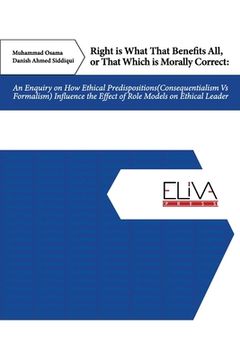Share
Right Is What That Benefits All, or That Which Is Morally Correct: An Enquiry on How Ethical Predispositions (Consequentialism Vs Formalism) Influence
Danish Ahmed Siddiqui
(Author)
·
Muhammad Osama
(Author)
·
Eliva Press
· Paperback
Right Is What That Benefits All, or That Which Is Morally Correct: An Enquiry on How Ethical Predispositions (Consequentialism Vs Formalism) Influence - Siddiqui, Danish Ahmed ; Osama, Muhammad
Choose the list to add your product or create one New List
✓ Product added successfully to the Wishlist.
Go to My Wishlists
Origin: U.S.A.
(Import costs included in the price)
It will be shipped from our warehouse between
Friday, July 05 and
Wednesday, July 17.
You will receive it anywhere in United Kingdom between 1 and 3 business days after shipment.
Synopsis "Right Is What That Benefits All, or That Which Is Morally Correct: An Enquiry on How Ethical Predispositions (Consequentialism Vs Formalism) Influence"
According to social learning theory, role models facilitate the acquisition of moral and other types of behavior. Yet, the question remains whether having had ethical role models influences one's perceptions of one's ethical leadership and, if so, what kinds of role models are important. Even bigger questions remain does these role models change the thinking pattern on Ethical Standards of Judgment that is crucial in making them an ethical leader. We attempted to answer these questions by proposing a theoretical framework, drawing on Brown & Treviño (2014) conceptualization of role models and moral leadership nexus, by focusing on the several types of moral role models as antecedents of perceived ethical leadership, while making moral predispositions as mediating a factor. These predispositions are broadly based around two frameworks: consequentialism and formalism (the tendency to assess moral situations in terms of their consequences to people, or, in terms of their consistent conformity to patterns or rules or some other formal features) Love et. al. (2020). We proposed that these dispositions are shaped by the role models and are instrumental in making an ethical leader. We explored three types of ethical role models: the leader's childhood role models, career mentors, and top managers. Empirical validity was created by directing a survey using close ended questionnaire. The results proposed that Roles models doesn't seems to exert any direct effect on ethical leadership (EL), however, career mentors have a positive indirect effect through both Consequentialism and Formalism, meaning these mentors inculcate the ethical predispositions of both Consequentialism and Formalism, and both in turn affect ethical leadership. Similarly, childhood role models also promote Consequentialist thinking which also have a positive effect on ethical leadership. Moreover, Ages also seems to have a positive impact on ethical leadership, moreover, is also complement the effect of career mentors on ethical leadership, meaning the influence of these mentors on ethical leadership are more pronounces in higher age respondents. We found no effect for top management ethical role models.

